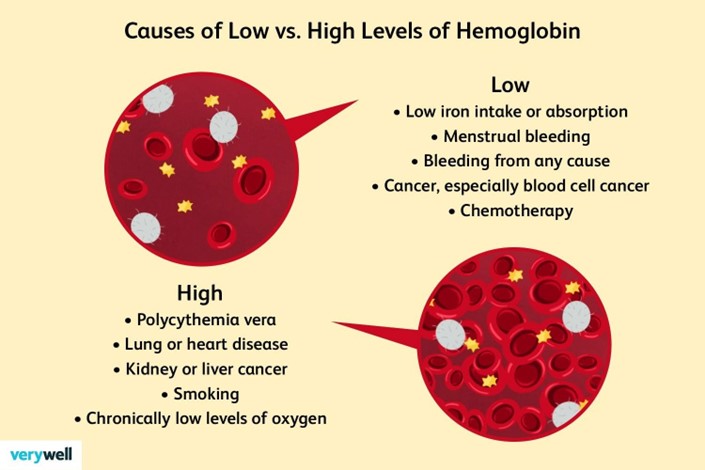A nurse is collecting data from a client whose Hgb is 8.8 mg/dL. Which of the following statements should the nurse expect?
"I feel tired all the time."
"I have noticed that my fingernails are becoming thicker."
"I have to go to the bathroom all the time."
"I notice that my hands are always shaky."
The Correct Answer is A
A hemoglobin (Hgb) level of 8.8 mg/dL indicates anemia, which is a decrease in the oxygen-carrying capacity of the blood. Fatigue and tiredness are common symptoms of anemia. When the body does not have enough hemoglobin to transport oxygen effectively, it can lead to feelings of fatigue and a lack of energy.
The other options are not directly associated with a low hemoglobin level:
b) "I have noticed that my fingernails are becoming thicker." Thicker fingernails are not typically associated with a low hemoglobin level. Changes in fingernails can be atributed to various factors, but they are not directly related to anemia.
c) "I have to go to the bathroom all the time." Frequent urination is not typically associated with a low hemoglobin level. It can be related to other factors such as urinary tract infections, diabetes, or diuretic use, among others.
d) "I notice that my hands are always shaky." Hand tremors are not directly associated with a low hemoglobin level. Tremors can have various causes, such as neurological conditions, medication side effects, or excessive caffeine intake, but they are not directly linked to anemia.

Nursing Test Bank
Naxlex Comprehensive Predictor Exams
Related Questions
Correct Answer is C
Explanation
c. Instruct the client to use abdominal breathing.
When a client is experiencing a panic atack, the nurse's first priority is to help the client manage their symptoms and provide immediate relief. Instructing the client to use abdominal breathing is the most appropriate initial intervention.
Explanation for the other options:
a. Discuss the client's feelings prior to the panic atack. While discussing the client's feelings can be beneficial in addressing the underlying causes of anxiety, it may not be the most effective immediate intervention during a panic atack. The client's focus during a panic atack is typically on managing the physical symptoms and regaining control.
b. Encourage the use of positive self-talk strategies. Positive self-talk can be helpful in managing anxiety in general, but during a panic atack, the individual may have difficulty engaging in positive self-talk due to the intensity of symptoms. Addressing the immediate physical symptoms is a priority before exploring coping strategies.
d. Administer an anti-anxiety medication. Medication administration may be necessary in some cases, but it is not the first-line intervention for managing a panic atack. Non-pharmacological interventions, such as breathing techniques, should be implemented first. If the panic atack persists or worsens despite these interventions, medication may be considered.
In summary, during a panic atack, the immediate focus should be on helping the client manage their symptoms. Instructing the client to use abdominal breathing can help promote relaxation and reduce the intensity of the panic atack.
Correct Answer is C
Explanation
The correct answer is Choice C.
Choice A rationale:
- While maintaining a distance of 3 feet can reduce the risk of direct contact transmission, it is not the most effective measure for contact isolation precautions.
- Contact isolation aims to prevent the spread of pathogens that can be transmitted through direct or indirect contact with the infected person or contaminated objects.
- A distance of 3 feet may not be sufficient to prevent transmission via droplets or fomites (inanimate objects that can harbor infectious agents).
Choice B rationale:
- Sterile gloves are not routinely required for contact isolation precautions.
- They are primarily used for sterile procedures or when there is a risk of exposure to blood or body fluids.
- For contact isolation, standard clean gloves are usually sufficient to protect against transmission via direct contact.
Choice C rationale:
- Leaving equipment that is used routinely in the client's room is a crucial part of contact isolation precautions.
- This practice prevents the spread of infection by minimizing the movement of potentially contaminated items outside of the isolation room.
- Equipment like stethoscopes, blood pressure cuffs, and thermometers should be dedicated to the client's use and not shared with other patients.
Choice D rationale:
- Negative-pressure airflow rooms are used for airborne isolation precautions, which are designed to prevent the spread of pathogens that can be transmitted through the air.
- Contact isolation does not specifically require a negative-pressure room, as the primary mode of transmission is through direct or indirect contact, not airborne particles.
Whether you are a student looking to ace your exams or a practicing nurse seeking to enhance your expertise , our nursing education contents will empower you with the confidence and competence to make a difference in the lives of patients and become a respected leader in the healthcare field.
Visit Naxlex, invest in your future and unlock endless possibilities with our unparalleled nursing education contents today
Report Wrong Answer on the Current Question
Do you disagree with the answer? If yes, what is your expected answer? Explain.
Kindly be descriptive with the issue you are facing.
